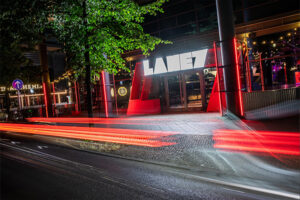ACROSS: How are you getting along in your new role?
MARCUS WILD: Broadly speaking, things are going well. The role that I have assumed is very exciting, indeed, particularly in light of all of the issues that are currently being driven by Covid-19. As a food retailer, Spar was able to increase its market share thanks to its regional network and its strong reputation for being reliable. Hervis, on the other hand, has been affected by the lockdowns, but it has benefited from the change in people’s sporting behavior. Bicycle sales, for example, are booming. Textile and footwear retailers, in particular, have been hit the hardest as a result of the lockdowns at our shopping centers. We are in the midst of extremely challenging times, but, to some extent, we always have been.
ACROSS: What are the main lessons that you have learned from this crisis?
WILD: All of the changes that the industry had undergone up to that point were minor compared to everything that this crisis has brought about. It has forced us to seriously think about logistics, consumer behavior, and issues that affect the retail industry as a whole. The main thing I have come to realize is that the strength that a company like Spar has is a major prerequisite for surviving times such as these. It is a diversified group and, more importantly, a family business that has benefited from the sustainability of its relationships – with suppliers, tenants, employees, and customers.
ACROSS: With regard to the relevance of relationships: Will the leases of your retailers be adjusted?
WILD: No. We have always based our rates on sales and will continue to do so in future. Therefore, if store partners or gastronomy operators are prosperous, they pay higher rents than they would have to if they were less prosperous. The partnership relationships that we have with our tenants have deepened as a result of the crisis. If a service-oriented business – a hairdresser, for example – finds itself in trouble as a result of the lockdowns and changing consumer behavior, we have to take action. To that end, we provide support to our retail partners when it comes to applying for subsidies, complying with government regulations, regional advertising, and so on.
ACROSS: How has the segment mix that can be found at shopping centers evolved?
WILD: To answer that question, one would need to know how the Covid-19 pandemic is developing. As I mentioned earlier, the textile and footwear segments have been under a great deal of pressure. Since people have been restricted in their ability to go out, youth-oriented concepts, in particular, have been subjected to various selection processes.
ACROSS: Have there been any changes with respect to catchment areas?
WILD: Yes, and those changes are primarily attributable to the fact that consumers have become more region-oriented when it comes to their purchases. On the one hand, the changes are the result of the legal requirements imposed during the lockdowns, and, on the other hand, they are the result of a return to localism. That is something we have noticed, for example, at Weberzeile in Ried im Innkreis and at Varena in Vöcklabruck. Both of those Upper Austrian cities, each of which has fewer than 20,000 inhabitants, have performed well. In my opinion, the trend toward regionalism will outlast the crisis.
ACROSS: To what degree has online retail been invigorated?
WILD: It has definitely been strengthened by the crisis. Nevertheless, major brands have still managed to reach consumers – by whatever means necessary. In the case of grocery stores, however, sales via the Internet continue to play a subordinate role. I expect that to remain the case for a while. There is one major function that online retailing is unable to fulfill now, nor will it be able to fulfill it in the future: It cannot function as a real-life meeting place. In fact, it is the crisis – and all of its associated distancing rules – that is responsible for making people aware of just how social they are and how much they enjoy spending time with each other. Such a need can be fulfilled at shopping centers. That is precisely why gastronomy and entertainment facilities are so vital.
ACROSS: Will successful shopping centers be separated from those that perform poorly: In other words, will there be a restructuring of the market?
WILD: I do not want to gloss over the fact that there are, indeed, some shopping centers that have suffered significantly as a result of the crisis, for example, those in tourist areas. If those in charge have used the compulsory downtime to offer innovative concepts, those shopping centers will be able to present themselves anew after the crisis and get off to a flying start. People feel that they need to make up for lost time, and that, of course, presents opportunities that have to be taken advantage of.
However, categories such as “good shopping centers” and “bad shopping centers” fail to capture the essence of the problem. I think the evolutionary parameters in retail have changed, and the real question is whether the paradigm shift is sustainable. Consumers who have made a greater number of purchases online throughout the crisis may well maintain that pattern of behavior. The bottom line, however, is that I expect the industry to succeed in making brick-and-mortar retail THE place to meet and buy for everyone again once the pandemic is over.







